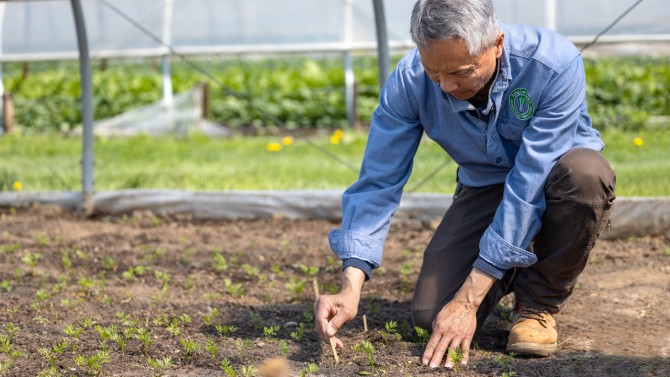In 2004, Fred Lee saw no other option but to sell off half his farm equipment - trucks, pipe, tractors, cultivators - an event that usually signals a farm is about to collapse. "Most farms, when they experience an auction, it means the end of the business," says Lee.
He and his then-wife couldn't afford the lease payments for most the 142 acres of land they farmed in Peconic, Long Island, where they grew Chinese cabbage, bok choi and other Asian vegetables wholesale for New York City restaurants. At the same time, fierce competition had tanked their markets.
"I was really sort of at wit's end," says Lee, who grew up working on the family farm with his father and uncles, leveraging Long Island's famous loamy soil and temperate climate. "I had to figure out, with what we had left, was it enough to keep going?"
Fred Lee checks the growth of carrots in one of the 18 greenhouses at Sang Lee Farms in Peconic, Long Island.
He called New York FarmNet. The free, confidential Cornell program provides farmers with two consultants, one specializing in ag finances, the other in the social and emotional dynamics of running a family farm. Cornell is the only land-grant university in the U.S. to offer the service.
The FarmNet consultants visited the farm, listened to the Lees, brainstormed solutions and suggested a plan of action.
"It was very instrumental," Lee says. "They said, 'You need X amount to really cover your expenses and move forward.' And so I focused on that number."
The Lees pivoted. They began selling directly to local customers by starting up a C.S.A. (community supported agriculture), an unusual model at the time. "While we didn't earn exactly the number that they had suggested," Lee says, "it was the beginning of opening the door to see the light at the end of the hallway."
Almost 20 years later, Sang Lee Farms is thriving. Lee and his family now grow more than 100 varieties of fruits, vegetables and herbs on about 100 acres, specializing in heirloom tomatoes, and orange and yellow seedless watermelon. They sell their harvest at their retail store, two farmers markets and to 650 C.S.A. members from Southampton to Queens. They also make value-added products, like orange rosemary scones, and run workshops for children and home gardeners. The farm employs nearly 50 people each summer, 20 in the winter.







